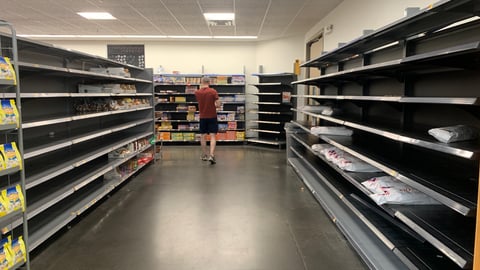Consumer Concerns Shift From Virus to Economy
Nearly 50% of U.S. consumers surveyed consider their personal finances to be "poor," according to Chicago-based dunnhumby's most recent study of the impact of COVID-19 on customer attitudes and behavior. This is an increase of nearly 20% since July.
The fifth phase of the data science firm's global Consumer Pulse Survey also found that 68% of consumers feel that the economy isn't doing well, and 91% said that they're closely watching store prices. Meanwhile, the “dunnhumby Worry Index,” a measure of how concerned consumers are about COVID-19, is now down to 24% in the United States, a drop of 5% from July.
“Retailers need to take note that most shoppers right now are on the hunt for more value by shopping at stores with regularly low prices, while also seeking discounts and promotions,” said Jose Gomes, president of North America for dunnhumby.
While worry about the virus is decreasing in the United States and globally (22%), just 50% of consumers in the United States and 48% globally believe that stores are doing a good job regarding the virus. Similarly, discontent with government actions continues to grow, with 77% of Americans surveyed disapproving of the government’s actions during the pandemic, compared with 67% of consumers globally.
“Since the pandemic first hit, we have been analyzing and studying consumer reactions to the virus, how it impacted their shopping behavior, and how they in turn reacted to retailers’ actions to combat the virus," noted Gomes. "Seven months after shutdowns, we are now seeing a major pivot, with consumer focus turning away from the virus itself to now being more concerned with increasing food prices, while the economy and their personal finances are deteriorating.”
Survey respondents’ concerns with higher food prices align with the latest Consumer Price
Index for Food, which reported that August food prices were 4.1% higher than in 2019. In
addition, food-at-home prices have increased 3.3% and food-away-from-home prices have
increased 2.6% in the same time frame.
Other key findings from the study include the following:
- Consumer shopping behaviors are again shifting as consumer worry decreases. The number of weekly shopping trips is increasing, with an average of 5.4 in wave five, compared with 3.8 in March. Fifty percent of respondents continue to shop fewer stores, 25% continue to spend more each trip, and 41% are getting takeout. However, while trips to the store are increasing, consumers still expect retailers to put specific safety precautions, like social distance markers, in place.
- Online shopping is now firmly rooted in 30% of all U.S. shopping trips. With online shopping reaching its tipping point during the pandemic, all signs point to U.S. consumers continuing to use this channel for 30% of all their trips now and in the future. Globally, online shopping accounts for 28% of all trips.
- Customers generally support retailers' COVID-related actions, except for rising prices. Wave five of the study found that 37% of shoppers noticed the rise of prices on virus-related items, but 72% of those reported the increase in prices was unnecessary.
- Customers are fighting price hikes by shopping at stores where prices are low, and searching for deals. As a result of rising prices, 58% of those surveyed are now shopping where regular prices are low, 43% are buying the lowest-priced products, 36% are using coupons, 34% are searching online for the best sales, and 21% are buying more private- brand items.
- Walmart dominates customers’ minds when it comes to value. Thirty-four percent of respondents rated Walmart first, with Aldi (12%) and Kroger (9%) coming in second and third, respectively.
For this study, dunnhumby surveyed more than 32,000 respondents online in 22 countries,
including the United States. The online interviews were conducted for wave one, March 29-April 1; wave two, April 11-14; and wave three, May 27-31. Due to the rapidly unfolding crisis in North America, dunnhumby conducted another set of online interviews for wave four, July 9 -July 12, in the United States, Canada and Mexico only. Wave 5 was conducted Aug. 28-Sept. 3. Approximately 400 individuals were interviewed in each country for each wave of the study, and respondents were roughly 60% female and 40% male.
Bentonville, Arkansas-based Walmart operates more than 11,300 stores under 58 banners in 27 countries, and e-commerce websites, employing 2.2 million-plus associates worldwide. Walmart U.S. is No. 1 on The PG 100, PG’s list of the top food and consumables retailers in North America, while Walmart-owned Sam's Club ranks No. 9. Cincinnati-based Kroger and Batavia, Illinois-based Aldi U.S. are Nos. 3 and 26, respectively, on PG's list.






